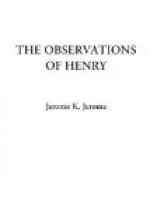I’d been engaged for the “heavy work,” but as the heaviest order I ever heard given there was for a cold ham and chicken, which I had to slip out for to the nearest cook-shop, I must have been chiefly useful from an ornamental point of view.
I’d been there about a fortnight, and was feeling pretty sick of it, when in walked young “Kipper.” I didn’t know him at first, he’d changed so. He was swinging a silver-mounted crutch stick, which was the kind that was fashionable just then, and was dressed in a showy check suit and a white hat. But the thing that struck me most was his gloves. I suppose I hadn’t improved quite so much myself, for he knew me in a moment, and held out his hand.
“What, ’Enery!” he says, “you’ve moved on, then!”
“Yes,” I says, shaking hands with him, “and I could move on again from this shop without feeling sad. But you’ve got on a bit?” I says.
“So-so,” he says, “I’m a journalist.”
“Oh,” I says, “what sort?” for I’d seen a good many of that lot during six months I’d spent at a house in Fleet Street, and their get-up hadn’t sumptuousness about it, so to speak. “Kipper’s” rig-out must have totted up to a tidy little sum. He had a diamond pin in his tie that must have cost somebody fifty quid, if not him.
“Well,” he answers, “I don’t wind out the confidential advice to old Beaky, and that sort of thing. I do the tips, yer know. ‘Cap’n Kit,’ that’s my name.”
“What, the Captain Kit?” I says. O’ course I’d heard of him.
“Be’old!” he says.




